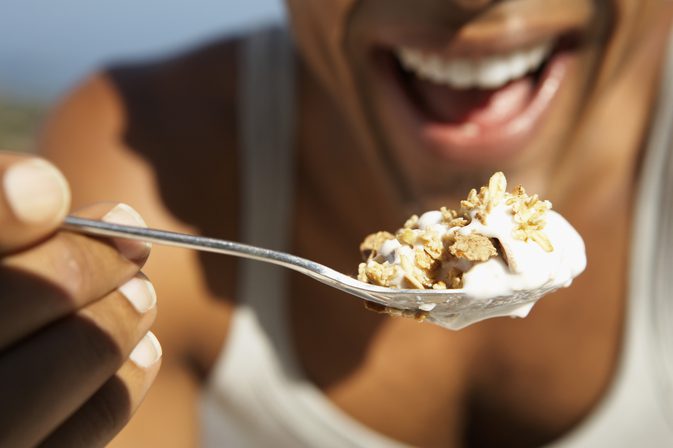PCOS is mostly prevalent hormonal endocrine disorders among women, affecting 1 in 10 women who are at their child-bearing age.

An early diagnosis of PCOS is important because it increase the risk of other chronic medical conditions and health issues such as insulin resistance, Type 2 Diabetes, hypertension, high cholesterol level and heart disease. The weight gain in PCOS is linked to increased insulin levels which in turn can cause the development of cysts on the ovaries.
PCOS too needs a relatively strict lifestyle approach with regular exercise, movement and a high protein diet to help manage insulin levels and support weight loss.
1. Stay away from foods that are super refined, processed and have a high sugar content. Stick to whole grain & complex carbohydrates.Talking of carbs, an intake of 30-40% of total calories, or roughly 100-140g per day from carbs depending on age and activity levels will support sustainable fat loss. In food terms this translates into 20-30g serves of carbs at breakfast and lunch, while focusing the evening meal around protein and vegetables as opposed to heavy rice and pasta based meals.
2. Also, space out your carbohydrate intake all over the day.
3. Protein rich foods primarily, egg, chicken, fish should be the key components of a PCOS diet. Team up these foods with small amounts of carbohydrate at regular meals throughout the day to regulate blood glucose levels and help to keep you full. Avoid red meat.
4. For a balanced diet when we reduce the amount of carbohydrate in diet, it means that we can increase the amount of fat we are eating, slightly. The key should be to get the right type of fats and specifically in the case of PCOS, to get the mix of fats that helps the cell to become more sensitive to insulin. These fats include the omega 3 fats found in walnuts, pumpkin seeds and soy and linseed bread. In food terms it means a PCOS diet should include 3-4 serves of fat each day via some olive oil, nuts and seeds and tuna or salmon at least 3-4 times each week.

5. Watch your meal timing, if you have PCOS make sure you leave at least 2-3 hours in between eating occasions.
6. Increase intake of Green Leafy vegetables: Vegetables have maximum nutrients per calories compared to other foods and also rich in calcium, iron, potassium, magnesium along with vitamins K, C and E and most importantly essential B vitamins which plays an imperative role in managing the symptoms of PCOS. B vitamins – especially B2, B3, B5 and B6 help in better sugar and fat metabolism, improve thyroid functioning and render better hormone balance, improve fertility all of which are essential for PCOS management. The minerals present in vegetables help to neutralize the acidity caused by inflammation and impaired glucose tolerance. Calcium helps in egg maturation and follicle development in ovaries; potassium is needed for FSH (Follicle Stimulation Hormone) production. It helps to reduce PMS symptoms and also promotes weight loss. Do include, colourful vegetables that are loaded with powerful antioxidants and help to neutralize the harmful effects of oxidative stress in women suffering from PCOS.
7. Make fruits an essential part of your diet, especially those that have low GI such as lime, strawberries, apricot, grapefruit, lemon, cantaloupe, guava, pear, oranges, watermelon, blueberries, nectarines, apples and kiwifruit. Low GI foods aid to keep you satiated for longer and prevent cravings.
8. Watch your caffeine intake: Excessive consumption of coffee (4 or more cups a day) can also affect fertility in women. Because PCOS already has a direct impact on fertility, coffee can make things worse. Cut down or eliminate caffeine from your diet to lessen the PCOS symptoms and improves fertility.
9. Stay away from alcohol consumption as it increase the risk of PCOS in women by almost 50% compared to those who don’t drink alcohol. The liver is the key organ that eliminates excess oestrogen from the body, but regular alcohol consumption puts excess pressure on the liver where flushing out the alcohol becomes its prime objective, and the task of removing oestrogen is pushed to the background which creates an oestrogen dominant environment in the body.

10. Dairy products and milk can be harmful in case of PCOS. Therefore, this healthy food also comes under the list of foods to avoid with PCOS. Consumption of milk can increase testosterone levels and a particular type of protein in milk that limits regular processing of testosterone in the body which causes the testosterone levels to keep rising without any barrier and it only makes the PCOS symptoms worse. Therefore, it is best to avoid milk, cheese, yogurt, butter and other milk products as much as possible
Make sure to drink plenty of fluids, i.e. 6-8 glasses. Do not forget the real meaning of “Diet” is nutrition and nourishment.
Disclaimer
The Content is not intended to be a substitute for professional medical advice, diagnosis, or treatment. Always seek the advice of your physician or other qualified health provider with any questions you may have regarding a medical condition.



